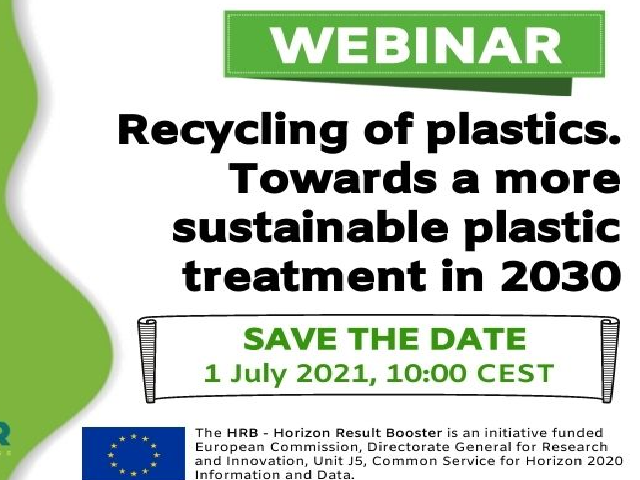PLAST2BCLEANED, together with sister projects holds the webinar recycling of plastics: towards a more sustainable plastic treatment in 2030

For two hours, from 10:00 to 12:00 (CEST), the projects will provide their different approaches to the current challenge of plastics recycling through the following presentations, among others:
CIRCULAR FLOORING: Recycling Polyvinyl chloride (PVC) from post-consumer flooring waste. Thomas Diefenhardt, Associate Scientist at Fraunhofer IVV.
CREAToR: Collection of raw materials, removal of flame retardants and reuse of secondary raw materials. Irma Mikonsaari, Project Manager at Fraunhofer Institute for Chemical Technology.
NONTOX: Toolbox of technologies to recycle hazardous plastics. Muhammad Saad Qureshi, Senior Scientist, VTT-Technical Research Centre of Finland.
PLAST2bCLEANED: recycling of Acrylonitrile butadiene styrene (ABS) and High Impact Polystyrene (HIPS), bromine and antimony trioxide from Waste Electrical and Electronic Equipment (WEEE) plastics. Esther Zondervan-van den Beuken, Senior Consultant Plastics at TNO.
More information and registrations on https://bit.ly/PLAST2jw(opens in new window)
About PLAST2bCLEANED
The overall aim of PLAST2bCLEANED is to develop a human and environmentally safe recycling process for Waste Electrical and Electronic Equipment (WEEE) plastics in a technically feasible and economically viable manner.
Three material loops will be closed: (1) polymer; (2), bromine fraction; and (3) antimony trioxide fraction.
About Circular Flooring
Circular Flooring aims to establish a circular recycling process for plasticized PVC from post-consumer waste flooring. In order to avoid the loss of valuable resources, increased CO₂ emissions and other environmental burdens of waste disposal, it is necessary to establish closed recycling loops for various material streams, as for example PVC floor coverings. Therefore, the Circular Flooring consortium is further developing the CreaSolv® Recycling Process to separate the PVC-resin from post-consumer floor coverings from legacy plasticisers (phthalic acid esters) that do not conform to the EU REACH-Directive.
About CREATOR
CREAToR is a project focused on process development and demonstration to remove hazardous, already banned bromine-containing flame-retardants from waste streams using continuous purification technologies: supercritical CO2 and cost-effective solvent-based processes using natural deep eutectic solvents (NADES) in twin-screw extruders. CREAToR will cover the whole value chain, starting from collecting thermoplastic waste streams from building and construction (B&C) and from waste electrical and electronic equipment (WEEE). The project will implement ways to collect secondary raw materials, identify the presence of hazardous flame retardants, remove these contaminants from the materials and finally reuse the materials.
About NONTOX
NONTOX project is a combination of multiple recycling technologies to recycle hazardous plastic waste generated from Waste Electrical and Electronic Equipment (WEEE), End of Life Vehicles (ELV) and Construction and Demolition Waste (CDW). The unique combination of mechanical and chemical recycling technologies imparts several techno-economic benefits over single conventional methods.
About REACT
The REACT project addresses the management of waste acrylic textiles coming from outdoor awnings and furnishing. A crucial issue is the analysis and removal of finishing substances that affect the secondary raw material purity and their management. Then a mechanical recycling process will be implemented to obtain second life fibre and fabrics, which performance will be tested for the best application.


